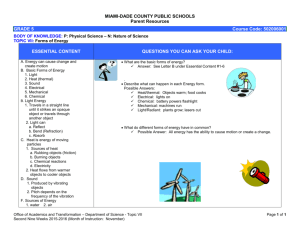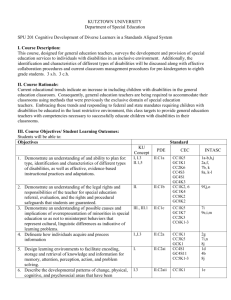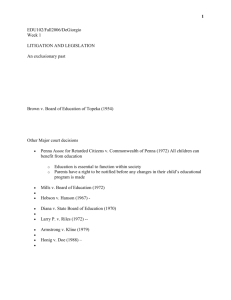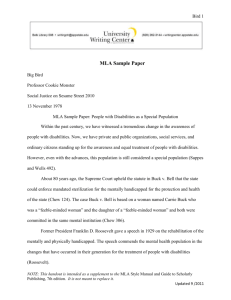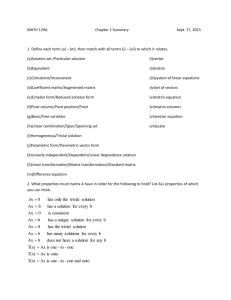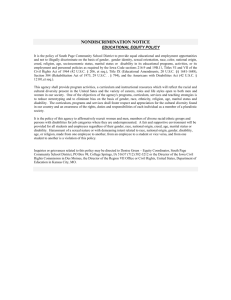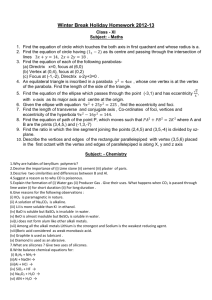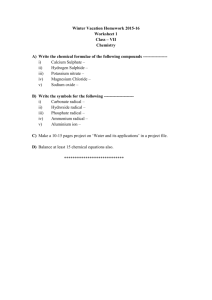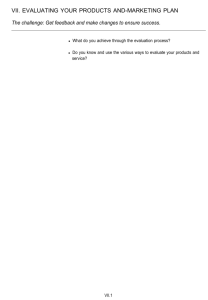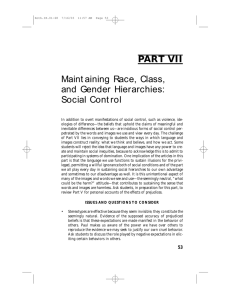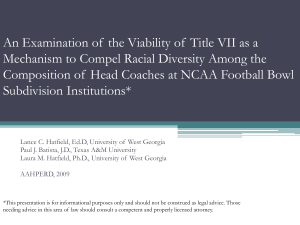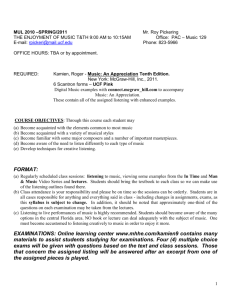KUTZTOWN UNIVERSITY
advertisement
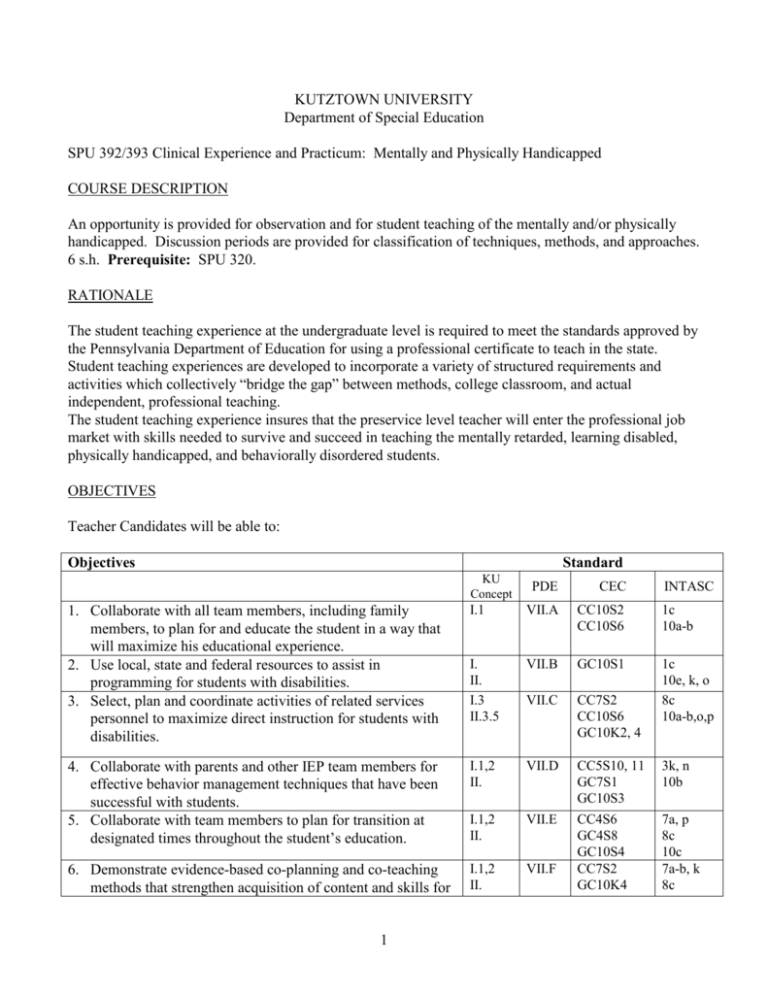
KUTZTOWN UNIVERSITY Department of Special Education SPU 392/393 Clinical Experience and Practicum: Mentally and Physically Handicapped COURSE DESCRIPTION An opportunity is provided for observation and for student teaching of the mentally and/or physically handicapped. Discussion periods are provided for classification of techniques, methods, and approaches. 6 s.h. Prerequisite: SPU 320. RATIONALE The student teaching experience at the undergraduate level is required to meet the standards approved by the Pennsylvania Department of Education for using a professional certificate to teach in the state. Student teaching experiences are developed to incorporate a variety of structured requirements and activities which collectively “bridge the gap” between methods, college classroom, and actual independent, professional teaching. The student teaching experience insures that the preservice level teacher will enter the professional job market with skills needed to survive and succeed in teaching the mentally retarded, learning disabled, physically handicapped, and behaviorally disordered students. OBJECTIVES Teacher Candidates will be able to: Objectives Standard KU Concept PDE CEC INTASC 1. Collaborate with all team members, including family members, to plan for and educate the student in a way that will maximize his educational experience. 2. Use local, state and federal resources to assist in programming for students with disabilities. 3. Select, plan and coordinate activities of related services personnel to maximize direct instruction for students with disabilities. I.1 VII.A CC10S2 CC10S6 1c 10a-b I. II. I.3 II.3.5 VII.B GC10S1 VII.C CC7S2 CC10S6 GC10K2, 4 1c 10e, k, o 8c 10a-b,o,p 4. Collaborate with parents and other IEP team members for effective behavior management techniques that have been successful with students. 5. Collaborate with team members to plan for transition at designated times throughout the student’s education. I.1,2 II. VII.D CC5S10, 11 GC7S1 GC10S3 3k, n 10b I.1,2 II. VII.E 6. Demonstrate evidence-based co-planning and co-teaching methods that strengthen acquisition of content and skills for I.1,2 II. VII.F CC4S6 GC4S8 GC10S4 CC7S2 GC10K4 7a, p 8c 10c 7a-b, k 8c 1 students with disabilities. 7. Identify and demonstrate an understanding of the roles of professional groups and referral agencies in identifying, assessing, and providing services to students with disabilities. 8. Work collaboratively with various general educators as students participate in the general education curriculum. 9. Utilize culturally responsive strategies that promote effective communication and collaboration with students with disabilities, families, school and agency personnel and community members. 10. Implement strategies to address concerns of students and families. 11. Demonstrate an understanding of, and apply, FERPA (Family Education Right to Privacy Act) and other privacy laws requiring confidentiality in all educational interactions with students, families, and community. 12. Demonstrate effective advocacy procedures. 13. Promote positive relationships to support collaboration and partnerships in order to effectively implement the IEP. 14. Identify methods to increase knowledge and pedagogical skills through participation in meaningful professional development. 15. Demonstrate integrity, ethical behavior, and professional conduct as stated in Pennsylvania’s Code of Professional Practice and Conduct for Educators; and local, state, and federal laws and regulations. 16. Implement procedures and legal requirements for safeguarding student health and welfare. I. II. VII.G GC9K1 GC10K3 10b 9d 10k I.1,2 VII.H CC10S6, 9 10b-c I.1,2 VII.I CC10K4 1k 10q I. VII.J CC10K3 I. II. VI.A CC9S4 CC10S1 1c 10d 9f, o I.1,2 VI.B I.1,2 VI.C CC9S3 GC9S2 CC10S3 9f 10j 10a-c, p II.1,2 VI.D CC9K3 CC9S11, 12 9a-b,k,n I. II.1,2 VI.E CC9S1-4 9o I. II.1,2 VI.F CC9S1, 4 9j ASSESSMENT Assessment of each teacher candidate’s level of accomplishment with reference to the course objectives will be based upon a subset the following: 1. 2. 3. 4. 5. 6. Completion of IEP. Completion of substitute teacher packet. Completion of individualized unit of instruction. Timely adherence to established time lines and due dates. Demonstration of ability to orchestrate classroom operations in an independent manner. Reflective journal COURSE OUTLINE 2 I. Suggested Student Teaching Requirements A. One-half of the student teaching semester will be spent in a classroom for mentally and/or physically handicapped students. (The other half is spent in a regular elementary setting to satisfy the dual major requirements.) B. The student teacher will observe the cooperating teacher, other special educators, and regular education teachers with whom the classes’ students are mainstreamed. C. The student teacher will begin teaching individuals and/or small groups of students. Assignment of teaching duties will be increased until the cooperating teacher’s full teaching responsibilities are assumed. (First half student teachers should culminate with one full week of teaching responsibilities; second half student teachers, two full weeks.) D. Detailed lesson plans shall be developed by the student teacher. As the student teacher becomes more proficient, development of short (block) planning will be encouraged. E. The student teacher will critically evaluate his/her planning and teaching performance. Conferences with the cooperating teacher and the university supervisor will be held regularly to discuss the student teacher’s progress. F. A unit of instruction, agreeable to both the cooperating teacher and the university supervisor will be developed and taught by the student teacher. G. The student teacher will critically evaluate a student and write an appropriate Individualized Education Plan (I.E.P.). The I.E.P. should be similar in format to one which would be developed in the host school’s I.E.P. process. H. The student teacher shall develop a substitute packet which would satisfactorily duplicate one used in a full-time teacher’s classroom. I. The student teacher shall develop a learning center and use it effectively in his/her class of exceptional learners. J. Two or more bulletin boards shall be developed and displayed in the student teacher’s classroom. K. The student teacher shall be encouraged to keep a log of pertinent happenings and/or anecdotal record of students during the student teaching experience. The log and/or anecdotal records will be shared with the university supervisor. L. The student teacher’s plans and projects should be maintained in an organized notebook. M. The student teacher is encouraged to have a video made of him/her teaching. N. The student teacher is encouraged to develop a professional portfolio. O. The student teacher will develop and implement a behavior management system. II. Suggested Practicum Activities: Discussion of: A. Student teaching requirements B. Lesson and unit planning C. Planning and implementing I.E.P.’s D. Methods for teaching handicapped students E. Materials for exceptional learners 3 F. G. H. I. J. K. L. M. N. O. Discipline and classroom management strategies Instructional Support Teams (I.S.T.) Professional ethics Sharing of successes, problems, and mutual concerns Interviews, resumes, and the job search process Unions and professional associations Professional portfolios Current trends in special education Employment and continued professional growth Assessment tools/evaluation 4 INSTRUCTIONAL RESOURCES Goor, M., & Santos, K. (2002). To think like a teacher: Cases for special education interns and novice teachers. Boston: Allyn and Bacon. Hurst, B., and Reding, G. (2006). Professionalism in Teaching (2nd Ed.). Upper Saddle River: Prentice Hall. Kellough, R. (2005). Your first year of teaching: Guidelines for success (2nd Ed.). Upper Saddle River: Prentice Hall. Rosenberg, M., O’Shea, L., & O’Shea, D. (2005). Student teacher to master teacher: A practical guide for educating students with special needs (3rd Ed.). Upper Saddle River, NJ: Prentice-Hall. Revised 6/2012 5
